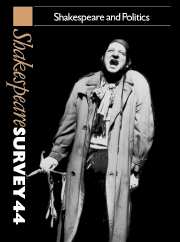Book contents
- Frontmatter
- Shakespeare and Politics
- Language, Politics, and Poverty in Shakespearian Drama
- Some Versions of Coup d’état, Rebellion and Revolution
- Woman, Language, and History in The Rape of Lucrece
- Love in Venice
- Two Kingdoms for Half-a-Crown
- ‘Fashion it thus’: Julius Caesar and the Politics of Theatrical Representation
- ’Demystifying the Mystery of State’: King Lear and the World Upside Down
- Tragedy, King Lear, and the Politics of the Heart
- The Politics of Shakespeare Production
- Shakespeare in the Trenches
- Shakespeare’s Earliest Editor, Ralph Crane
- Shakespeare’s Falconry
- Telling the Story of Shakespeare’s Playhouse World
- Shakespeare Performances in England, 1989–90
- Professional Shakespeare Productions in the British Isles January-December 1989
- Critical Studies
- Shakespeare’s Life, Times, and Stage
- Editions and Textual Studies
- Books Received
- Index
Editions and Textual Studies
Published online by Cambridge University Press: 28 March 2007
- Frontmatter
- Shakespeare and Politics
- Language, Politics, and Poverty in Shakespearian Drama
- Some Versions of Coup d’état, Rebellion and Revolution
- Woman, Language, and History in The Rape of Lucrece
- Love in Venice
- Two Kingdoms for Half-a-Crown
- ‘Fashion it thus’: Julius Caesar and the Politics of Theatrical Representation
- ’Demystifying the Mystery of State’: King Lear and the World Upside Down
- Tragedy, King Lear, and the Politics of the Heart
- The Politics of Shakespeare Production
- Shakespeare in the Trenches
- Shakespeare’s Earliest Editor, Ralph Crane
- Shakespeare’s Falconry
- Telling the Story of Shakespeare’s Playhouse World
- Shakespeare Performances in England, 1989–90
- Professional Shakespeare Productions in the British Isles January-December 1989
- Critical Studies
- Shakespeare’s Life, Times, and Stage
- Editions and Textual Studies
- Books Received
- Index
Summary
New editions of three of Shakespeare’s plays from Oxford (Macbeth, The Merry Wives of Windsor, and Love’s Labour’s Lost) and four from Cambridge (2 Henry IV, Henry VIII, 1 Henry VI and King John), of the narrative poems from Penguin and of a new venture in photo-facsimile publishing, amounting in all to well over two thousand pages, present a daunting prospect to the neophyte reviewer. All of these editions contain valuable and useful material, which Shakespeare scholars cannot afford to ignore: they all deserve close attention, but they are of rather varying quality.
The single-volume Oxford and Cambridge editions go their different ways, the one rather grand and austere, the other from time to time quite lively. As a whole the introductions to these editions are disappointing. Only Brooke's to Macbeth rises above the discussion of character and narrative and, while the other editors have interesting things to say about the plays, they are surprisingly lacking in ideas about them as dramatic fictions. Too often (especially with this group of plays), editors resort to an appeal to the theatre of the 'This may not be Shakespeare's best or most interesting play, but it works on the stage' kind. Most of the editors of the Oxford and Cambridge volumes feel that the way to show how the play works in the theatre is to go through its plot but, with the exception of Beaurline's King John (heavily indebted to Emrys Jones), they make little use of scenic analysis and rarely point out Shakespeare's self-borrowing beyond the purely verbal level. Few editors draw qn the work of Shakespeare's contemporaries outside the theatre to set his achievements in the context of Renaissance poetry or prose; there is little here to suggest how he might be responding to the works of other writers.
- Type
- Chapter
- Information
- Shakespeare Survey , pp. 244 - 256Publisher: Cambridge University PressPrint publication year: 1991



